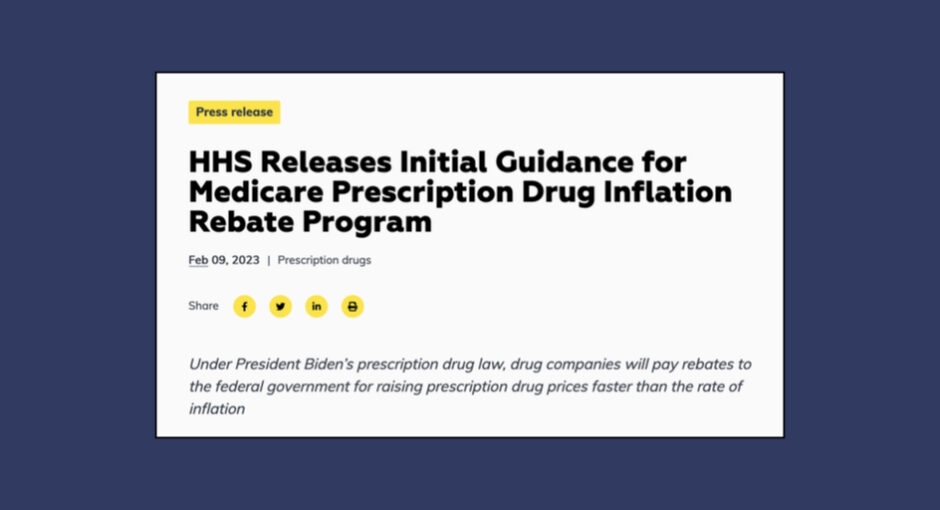The U.S. Centers for Medicare & Medicaid Services is seeking comments by March 11 on “the most reliable way to identify” 340B-purchased drugs dispensed to Medicare Part D beneficiaries so they can be excluded from new Part D inflation rebate invoices.
CMS asked for the input in Medicare program guidance issued Feb. 9. The document describes pros and cons of requiring pharmacies either (a) to use the “20” claims submission clarification code at time of adjudication or dispensing or (b) requiring pharmacies to submit an “N1” claims transaction retrospectively to identify 340B-acquired drugs.
Health care providers have objected to both methods when states and pharmacy benefit managers have ordered their use. Two years ago they expressed shock and warned of devasting financial consequences when Express Scripts said covered entities and their contract pharmacies had to identify 340B claims retrospectively by submitting an “N1” transaction.
Most 340B contract pharmacy arrangements use a virtual inventory model in which pharmacies fill prescriptions with their own purchased stock, which when it runs out is replenished with the entity’s 340B-purchased stock. Entities told Express Scripts that they and their contract pharmacies are not equipped to use the “N1” transaction. Some said privately at the time that they feared that their contract pharmacies, to remain in good standing with Express Scripts, would stop filling the entities’ 340B-eligible prescriptions with 340B-purchased drugs for claims submitted to the PBM for reimbursement.
CMS’s new guidance sets initial requirements and procedures for its new Medicare Prescription Drug Inflation Rebate Program. Under the Inflation Reduction Act enacted last August, drug makers must pay Medicare Parts B and D rebates on select drugs when prices rise faster than inflation. 340B-acquired drugs are excluded from the rebates. CMS issued two guidance documents on Feb. 9, one on Part B inflation rebates and the other on Part D rebates.
Part B Guidance
CMS got a head start on implementing the Part B rebates on Dec. 20 when it issued guidance requiring hospital and grantee entities to use “JG” and “TB” modifiers to identify 340B-purchased drugs billed to Part B. The requirement takes effect Jan. 1, 2024, but CMS is urging entities to start using the modifiers as soon as possible.
Hospitals have been using these modifiers since 2018. The U.S. Department of Health and Human Services Office of the Inspector General recommended last week that CMS monitor non-hospital entities’ use of the modifiers since they have not been using them.
The Part B guidance that CMS issued last week largely repeated what it said Dec. 20 and what OIG recommended Feb. 7.
Manufacturers have been subject to the new Part B inflation rebates since the start of this year, but CMS has until Sept. 30, 2025, to invoice for these rebates. OIG said in its report last week that, “for 2023 rebate calculations in particular, CMS may need to take steps to identify claims for 340B-purchased drugs that are submitted without a 340B modifier.” CMS said in its guidance two days later that it “is soliciting comments on the identification and removal of 340B units for calendar quarters in 2023.”
Part D Guidance
CMS’s statements in the companion guidance document it issued Feb. 9 were its first on how it is approaching excluding 340B drugs from Part D inflation rebate invoices.
“Because this requirement starts after the first quarter of the applicable period that begins in October 2025, CMS intends to exclude the 340B units starting in January 2026,” the agency said.
“CMS believes that requiring that a 340B indicator be included on the [Part D Prescription Drug Event] PDE record is the most reliable way to identify drugs that are subject to a 340B discount that were dispensed under Medicare Part D,” CMS said. “This indicator would need to be included on all pharmacy claims where a drug subject to a 340B discount was dispensed to a Part D beneficiary so that units submitted on such claims can be excluded from the inflation rebate calculation.”
CMS noted that the current “20” submission clarification code for 340B drugs is optional for pharmacies to use based on trading partner agreements and “can only be used prospectively, so a pharmacy that makes the retrospective determination that the drug was purchased at 340B pricing cannot apply the modifier retrospectively to the claim.”
It said an “N1” transaction may be used “to retrospectively identify drugs purchased under the 340B pricing, but CMS understands that few pharmacies use this transaction.”
“Consequently, CMS does not currently require or even accept a 340B indicator on the PDE record,” it said.
“CMS is soliciting comment on whether submission of the 340B identifier on the pharmacy claim is the preferred mechanism to identify 340B units dispensed in Part D, or if there is a better alternative,” the agency said. “In other words, CMS is interested in ascertaining the most reliable way to identify Part D claims filled with 340B units so these associated units can be excluded from the determination of units of Part D rebatable drugs beginning in 2026 in accordance with the statute.”
CMS said comments should be sent to IRARebateandNegotiation@cms.hhs.gov with the subject line “Medicare Part D Inflation Rebate Comments” by March 11, 2023.


